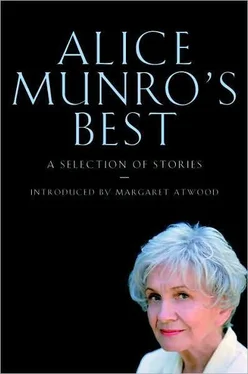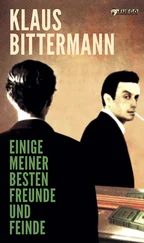Another time, on the way home, she saw at the town end of the bridge a boy in a blue jacket, apparently looking at the water. Eighteen, nineteen years old. Nobody she knew. Skinny, weakly-looking, something the matter with him, she saw at once. Was he thinking of jumping? Just as she came up even with him, what does he do but turn and display himself, holding his jacket open, also his pants. What he must have suffered from the cold, on a day that had Flo holding her coat collar tight around her throat.
When she first saw what he had in his hand, Flo said, all she could think of was What is he doing out here with a baloney sausage?
She could say that. It was offered as truth; no joke. She maintained that she despised dirty talk. She would go out and yell at the old men sitting in front of her store.
“If you want to stay where you are you better clean your mouths out!”
Saturday, then. For some reason Flo is not going uptown, has decided to stay home and scrub the kitchen floor. Perhaps this has put her in a bad mood. Perhaps she was in a bad mood anyway, due to people not paying their bills, or the stirring-up of feelings in spring. The wrangle with Rose has already commenced, has been going on forever, like a dream that goes back and back into other dreams, over hills and through doorways, maddeningly dim and populous and familiar and elusive. They are carting all the chairs out of the kitchen preparatory to the scrubbing, and they have also got to move some extra provisions for the store, some cartons of canned goods, tins of maple syrup, coal-oil cans, jars of vinegar. They take these things out to the woodshed. Brian, who is five or six by this time, is helping drag the tins.
“Yes,” says Flo, carrying on from our lost starting point. “Yes, and that filth you taught to Brian.”
“What filth?”
“And he doesn’t know any better.”
There is one step down from the kitchen to the woodshed, a bit of carpet on it so worn Rose can’t ever remember seeing the pattern. Brian loosens it, dragging a tin.
“Two Vancouvers,” she says softly.
Flo is back in the kitchen. Brian looks from Flo to Rose and Rose says again in a slightly louder voice, an encouraging singsong, “Two Vancouvers–”
“Fried in snot!” finishes Brian, not able to control himself any longer.
“Two pickled arseholes–”
“—tied in a knot!”
There it is. The filth.
Two Vancouvers fried in snot!
Two pickled arseholes tied in a knot!
Rose has known that for years, learned it when she first went to school. She came home and asked Flo, what is a Vancouver?
“It’s a city. It’s a long ways away.”
“What else besides a city?”
Flo said, what did she mean, what else? How could it be fried, Rose said, approaching the dangerous moment, the delightful moment, when she would have to come out with the whole thing.
“Two Vancouvers fried in snot!/Two pickled arseholes tied in a knot!”
“You’re going to get it!” cried Flo in a predictable rage. “Say that again and you’ll get a good clout!”
Rose couldn’t stop herself. She hummed it tenderly, tried saying the innocent words aloud, humming through the others. It was not just the words snot and arsehole that gave her pleasure, though of course they did. It was the pickling and tying and the unimaginable Vancouvers. She saw them in her mind shaped rather like octopuses, twitching in the pan. The tumble of reason; the spark and spit of craziness.
Lately she has remembered it again and taught it to Brian, to see if it has the same effect on him, and of course it has.
“Oh, I heard you!” says Flo. “I heard that! And I’m warning you!”
So she is. Brian takes the warning. He runs away, out the woodshed door, to do as he likes. Being a boy, free to help or not, involve himself or not. Not committed to the household struggle. They don’t need him anyway, except to use against each other, they hardly notice his going. They continue, can’t help continuing, can’t leave each other alone. When they seem to have given up they really are just waiting and building up steam.
Flo gets out the scrub pail and the brush and the rag and the pad for her knees, a dirty red rubber pad. She starts to work on the floor. Rose sits on the kitchen table, the only place left to sit, swinging her legs. She can feel the cool oilcloth, because she is wearing shorts, last summer’s tight faded shorts dug out of the summer-clothes bag. They smell a bit moldy from winter storage.
Flo crawls underneath, scrubbing with the brush, wiping with the rag. Her legs are long, white, and muscular, marked all over with blue veins as if somebody had been drawing rivers on them with an indelible pencil. An abnormal energy, a violent disgust, is expressed in the chewing of the brush at the linoleum, the swish of the rag.
What do they have to say to each other? It doesn’t really matter. Flo speaks of Rose’s smart-aleck behavior, rudeness and sloppiness and conceit. Her willingness to make work for others, her lack of gratitude. She mentions Brian’s innocence, Rose’s corruption. Oh, don’t you think you’re somebody, says Flo, and a moment later, Who do you think you are? Rose contradicts and objects with such poisonous reasonableness and mildness, displays theatrical unconcern. Flo goes beyond her ordinary scorn and self-possession and becomes amazingly theatrical herself, saying it was for Rose that she sacrificed her life. She saw her father saddled with a baby daughter and she thought, What is that man going to do? So she married him, and here she is, on her knees.
At that moment the bell rings, to announce a customer in the store. Because the fight is on, Rose is not permitted to go into the store and wait on whoever it is. Flo gets up and throws off her apron, groaning — but not communicatively; it is not a groan whose exasperation Rose is allowed to share — and goes in and serves. Rose hears her using her normal voice.
“About time! Sure is!”
She comes back and ties on her apron and is ready to resume.
“You never have a thought for anybody but your ownself! You never have a thought for what I’m doing.”
“I never asked you to do anything. I wish you never had. I would have been a lot better off.”
Rose says this smiling directly at Flo, who has not yet gone down on her knees. Flo sees the smile, grabs the scrub rag that is hanging on the side of the pail, and throws it at her. It may be meant to hit her in the face but instead it falls against Rose’s leg and she raises her foot and catches it, swinging it negligently against her ankle.
“All right,” says Flo. “You’ve done it this time. All right.”
Rose watches her go to the woodshed door, hears her tramp through the woodshed, pause in the doorway, where the screen door hasn’t yet been hung, and the storm door is standing open, propped with a brick. She calls Rose’s father. She calls him in a warning, summoning voice, as if against her will preparing him for bad news. He will know what this is about.
The kitchen floor has five or six different patterns of linoleum on it. Ends, which Flo got for nothing and ingeniously trimmed and fitted together, bordering them with tin strips and tacks. While Rose sits on the table waiting, she looks at the floor, at this satisfying arrangement of rectangles, triangles, some other shape whose name she is trying to remember. She hears Flo coming back through the woodshed, on the creaky plank walk laid over the dirt floor. She is loitering, waiting too. She and Rose can carry this no further by themselves.
Rose hears her father come in. She stiffens, a tremor runs through her legs, she feels them shiver on the oilcloth. Called away from some peaceful, absorbing task, away from the words running in his head, called out of himself, her father has to say something. He says, “Well? What’s wrong?”
Читать дальше












